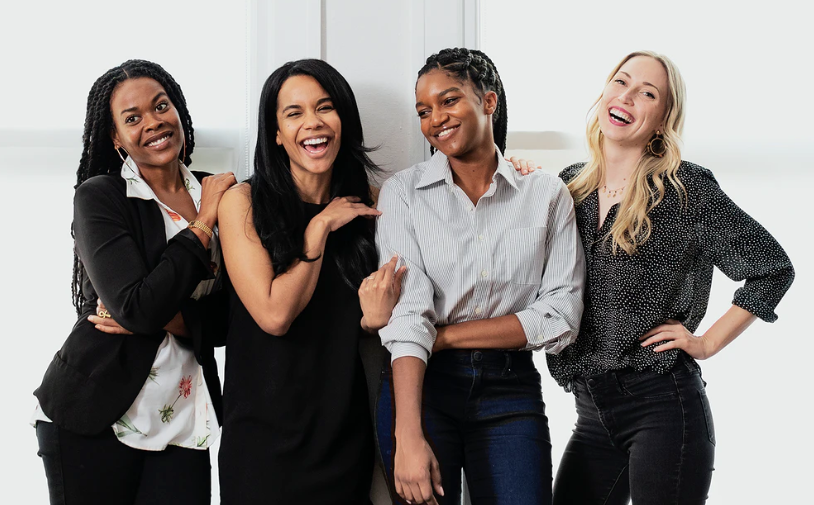Two Boss Women Go Behind The Scenes About Tech Inclusion

As a nonprofit professional turned techie, and a Black woman, I’m curious about the experiences of people of color in tech leadership. Historically, tech has been dominated by White and Asian men. Today, most global companies have a diversity & inclusion strategy and explicit targets to increase the percentage of women, underrepresented people of color and other marginalized groups. Progress has been riddled with challenges.
So I wondered, what’s it like to be a boss in a space where few people look like you or share your worldview?
I recently spoke with Mercedes Jenkins, a Diversity, Equity & Inclusion Strategist, and Robin Miles, a Leadership Development Manager. Both Miles and Jenkins identify as people of color and are senior learning and development leaders for global technology companies. I interviewed them separately to fully understand their perspectives.
The conversations were honest and enlightening. I’ve included a few gems below.

Mercedes Jenkins (left) Robin Miles, Ph.D. (right)
Build Cross Functional Relationships
Miles and Jenkins were clear that effective leadership is rooted in knowing and valuing the business functions of everyone that you’re working with. Understanding how their priorities contribute to the business needs will help you know how to engage with them. Essentially, learn how to speak their language in order to move the conversation forward.
Diversity & Inclusion Is A Business Practice
While some assume that Diversity, Equity and Inclusion [DEI] is important to people of color because of their identity, it’s actually a smart business practice. Miles explained that teams with more diverse perspectives are proven to be more profitable. As a senior executive, she is working to create a learning journey for employees and executives. This means that diversity is a part of everyone’s conversation and becomes integral to company culture.
Miles:
“People assume that because [DEI] is people related, the function should reside solely in HR. Yes, there is an employee advocacy component, awareness, and Learning & Development. There are so many other functions. Within my company we’ve designed a convergence of Learning & Development and [DEI] practices”.

Wondering what DEI is? Jenkins explains:
“Diversity is attributes like race, gender, sexual orientation, age, ability. It also can be social attributes like socioeconomic class and neuro-diversity. Diversity is not code for Black & Brown and women. Equity focuses on meeting people where they are and acknowledging that there are gaps and some people aren’t even starting at the same place. Inclusion is creating with communities and not for communities.”
Jenkins’ approach for getting people to value DEI:
“It’s about connecting everything that happens outside of work to inside of work. We all have different lived experiences.” Particularly for employees that belong to a majority group, she asks them to think about their career paths and reflect on the type of support they received and resources they had access to. She uses company trainings to introduce concepts like access, opportunity, unconscious bias, and social privilege.

Bringing Your Whole Self Is Complex
While Jenkins’ and Miles spoke about the value of bringing your whole self to work, they interpret authenticity as a personal choice complicated by culture, race and even generational habits. Authenticity also requires a workplace where people, especially those who have been historically marginalized, can feel psychologically safe to express themselves.
Jenkins shares:
“I have tattoos all over, I have many piercings, I’ve tried all different hair styles, I love wearing sneakers … I express myself through my visual appearance. I try to model this as much as possible so that when other folks see me or interact with me, they feel like they can come to work and just be as comfortable as possible in their own skin. I know that is not an experience for everyone. I recognize that I am half Black and half Latinx, I have light-skinned privilege. I know that Black women that I work with in the tech industry don’t have the luxury of feeling [this] way.”
There is no one size fits all employee engagement strategy to quickly create spaces where authenticity can happen. What can be useful, Jenkins and Miles shared, is focusing on equity and allowing employees to create a culture that they value and feel comfortable in.

The Takeaway
To close out our conversations, I asked Miles and Jenkins to share advice about career elevation.
Miles:
“Work on having a vision for yourself that aligns with who you were created to be. Oftentimes we have the potential but our level of self-concept doesn’t align with our truest potential. We just don’t see ourselves in that light. [Seeing yourself in that light] requires self-exploration and self excavation. Align with your purpose and be unapologetic about it.”
Jenkins:
“Be you, you are bad-ass and powerful and folks need to hear your voice. Don’t ever stop learning, listening and taking time to reflect on your journey”.
It’s impossible to know the true experience of all people of color in tech leadership, but talking to Miles and Jenkins provided great insight. Success can be found in building cross-functional relationships and leaning into Diversity, Equity and Inclusion as a business practice.






